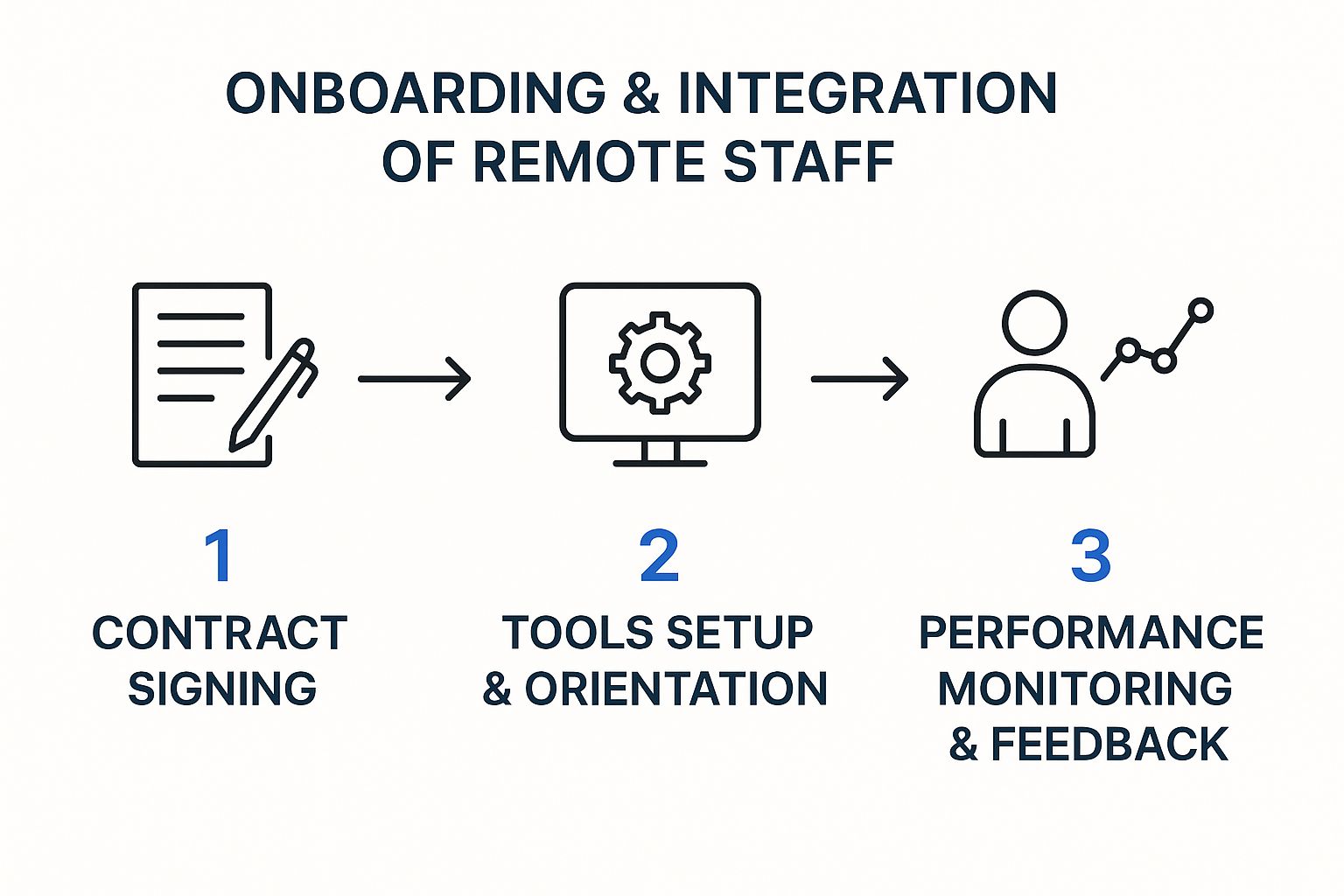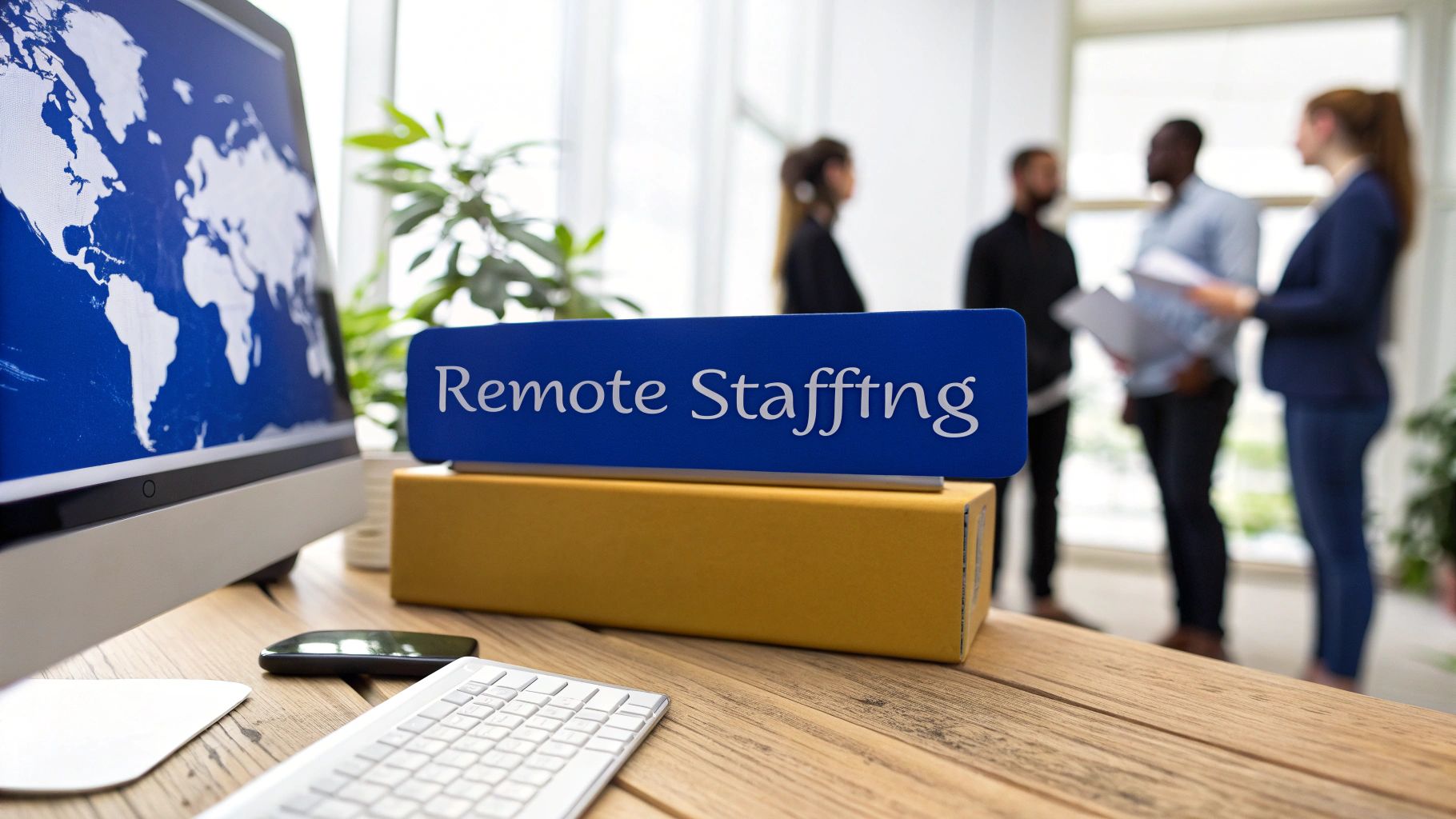Think of a remote staffing agency as your expert partner for hiring talent, no matter where they are in the world. They take the entire headache of international recruitment off your plate—from finding and vetting candidates to sorting out the complexities of global payroll and legal compliance.
Essentially, they make building a high-performing global team achievable for any business.
The Global Shift to Remote Teams

The workplace as we knew it has changed for good. Remote work isn't just a trendy perk anymore; it's become a core business strategy. This shift is powered by two things: talented people demanding more flexibility and companies realising they need the best skills, regardless of postcode.
This new reality created a gap for specialists who can navigate the vast sea of international talent.
Imagine you're on a complex expedition. A remote staffing agency is your seasoned guide. Their job is to map out the best route, helping you sidestep the hidden pitfalls of international hiring, like legal compliance nightmares, cultural clashes, and time-wasting recruitment cycles.
The Driving Forces Behind Remote Staffing
A few key factors have really pushed the move towards building distributed teams. For UK businesses, these aren't just passing trends—they're fundamental to staying competitive. The main drivers are:
- Access to a Wider Talent Pool: You're no longer restricted by geography. You can find the perfect person for the job, not just the best person available in your local area.
- Demand for Flexibility: A huge chunk of today's workforce now expects remote or hybrid options. Offering it is no longer a bonus; it's essential for attracting and keeping the best people.
- The Search for Specialised Skills: Finding niche expertise, especially in fields like tech and finance, can be incredibly tough locally. Hiring globally opens up a world of highly qualified professionals.
This evolution is precisely why remote staffing agencies have become so crucial for any company with global ambitions. The worldwide move to remote teams isn't happening in a vacuum; it’s a key piece of the broader digital transformation roadmap that smart businesses are following.
By tapping into a global workforce, companies can overcome local talent shortages, reduce operational costs, and build more diverse, resilient teams ready to tackle future challenges.
Here in the UK, the data backs this up completely. Recent figures show that around 40% of UK workers now do some form of remote work. Even more telling, online job adverts that mention remote working have shot up by over 300% since 2020.
It's clear that building a remote team isn't just an alternative anymore—it's a central pillar of modern business strategy.
How Remote Staffing Agencies Work

So, how do these agencies actually operate? It’s helpful to start with an analogy.
Think of a traditional recruiter as a local farmers' market. They're fantastic at finding the best talent available in your immediate area. A remote staffing agency, on the other hand, is more like a global logistics expert for people. They don't just find talent; they manage the entire complex journey of sourcing top professionals from anywhere in the world and plugging them seamlessly into your team.
At their core, these agencies are global matchmakers. Their main job is to connect what your company needs with the enormous international pool of skilled people ready to work from anywhere.
Sourcing and Vetting Global Talent
The whole process kicks off with a deep dive into your specific needs. A great agency will want to understand more than just the technical skills for the role; they’ll get to grips with your company culture, your team’s dynamics, and where you're headed long-term. Armed with this insight, they tap into their extensive global networks to find potential candidates.
And this isn't just a quick search on a job board. These agencies have built-up talent pipelines across different countries and specialisms, giving them access to people you'd never find on your own.
Once they’ve identified potential candidates, the real work begins: the vetting process. This is where they save you an incredible amount of time and significantly lower the risk of a bad hire. The screening is thorough and usually covers:
- Technical Skills Assessments: Candidates are put through their paces with practical tests and portfolio reviews to prove they can actually do the job.
- Soft Skills Evaluation: They look for strong communication, problem-solving skills, and self-discipline—all absolutely essential for anyone working remotely.
- Cultural Fit Analysis: This step ensures a candidate's working style and values match your company’s, making for a much smoother integration.
By handling all this intensive screening, the agency gives you a small, hand-picked list of finalists. These aren't just people who look good on paper; they're genuinely strong matches for your team.
Managing International HR and Compliance
Perhaps the single biggest headache that remote staffing agencies solve is navigating the maze of international HR and legal compliance. Hiring someone from another country opens up a can of worms—legal and financial hurdles that most companies are completely unprepared for.
The agency shoulders this entire burden by acting as the Employer of Record (EOR). In simple terms, this means they become the legal employer of the talent in their home country, on your behalf.
It’s a similar model to how a business might use contact center outsourcing to let a partner handle all the operational complexities. By acting as the EOR, the agency takes care of everything:
- Local Payroll Processing: They make sure your team member is paid accurately and on time, dealing with local currencies and banking rules.
- Tax Withholding: The agency manages all the necessary tax deductions according to the employee’s national laws, taking that risk completely off your plate.
- Statutory Benefits: They administer required benefits like health insurance, pension contributions, and paid leave as dictated by local laws.
- Employment Contracts: They draft legally sound contracts that protect both your company and the employee.
By offloading these critical functions, you get to focus on what really matters: integrating your new hire and growing your business, all with the peace of mind that the legal and admin side is being handled by experts.
Gaining a Competitive Edge with Remote Talent

Partnering with a great remote staffing agency isn’t just about filling an empty seat. It’s a strategic move that can fundamentally change your company’s growth trajectory, unlocking serious cost savings, instant access to global talent, and a sharper operational focus.
Think of it as expanding your toolkit. By breaking free from the limitations of local hiring, you gain an immediate competitive advantage that's simply out of reach when you’re confined to a commutable radius. This shifts recruitment from a local headache into a global opportunity.
Ultimately, these agencies are a powerful lever, helping you scale your business more intelligently and sustainably.
Drastically Reduce Your Operational Costs
One of the first and most powerful benefits you'll notice is the impact on your bottom line. Hiring locally comes with a long list of costs, both obvious and hidden—from inflated salaries in competitive UK cities to the ever-present overheads of running an office.
When you source talent from regions with a different cost of living, you can bring on highly skilled professionals for a fraction of what you’d pay at home. A top-tier software developer based in a global tech hub, for example, will often have a much lower salary expectation than their UK counterpart, without any drop in quality or expertise.
This financial advantage goes well beyond salaries. A remote-first model inherently cuts costs in other key areas:
- Office Space: Fewer desks mean lower rent, fewer utility bills, and reduced facility management costs.
- Recruitment Overheads: The agency handles the expensive and time-consuming work of sourcing, vetting, and interviewing.
- Employee Benefits: The agency manages all statutory benefits according to local laws, which are often less costly than in the UK.
This frees up your budget, allowing you to re-invest cash from operational expenses directly into growth activities like product development, marketing campaigns, or customer support.
Access a World of Specialised Talent
Have you ever spent months searching for a candidate with a very specific, niche skill set, only to come up empty in your local area? It’s a common bottleneck that stifles innovation and slows down growth. Remote staffing agencies eliminate that geographical barrier entirely, opening up a global marketplace of experts.
Suddenly, finding that data scientist with niche machine learning experience or that cybersecurity specialist with rare certifications is no longer an impossible task. You’re not just hiring the best person available; you’re hiring the best person for the role, full stop.
This global reach is a game-changer when you:
- Need to fill highly technical or specialised positions.
- Want to build a diverse team with a range of perspectives and experiences.
- Are scaling rapidly and need to hire multiple skilled professionals at once.
Tapping into this worldwide talent pool lets you build a more capable, creative, and resilient team. Of course, to get it right, you need to develop solid remote hiring strategies to ensure you’re attracting and integrating the very best global talent effectively.
Streamline Operations and Boost Efficiency
Beyond the talent and financial gains, working with a remote staffing agency fundamentally simplifies your internal operations. The administrative burden of international hiring is huge—think complex payroll, tax compliance, and navigating unfamiliar foreign labour laws.
A good agency handles all of it by acting as the Employer of Record. This completely frees up your internal HR and finance teams from getting bogged down in legal frameworks they don’t know. Instead, they can focus on the strategic initiatives that actually drive your business forward.
By outsourcing the complex administrative functions of global hiring, you empower your core team to concentrate on what they do best—innovating, managing, and growing the business.
This streamlined approach is a massive boost for efficiency, especially for scaling companies where internal resources are already stretched thin. It’s a pragmatic way to expand your team without expanding your administrative headaches.
It’s also about meeting the modern workforce where they are. In Great Britain, recent figures show that around 14% of workers were exclusively home-based as of mid-2025, with another 26% working in a hybrid model. These stats show just how much the workplace is changing, and agencies are perfectly positioned to find candidates who thrive in these new environments. You can explore more on these trends with research from Statista.
Finding Your Ideal Candidate Step By Step
Working with a remote staffing agency takes the guesswork out of hiring globally. What could be a complicated, messy process becomes a clear, step-by-step journey. A good agency has a battle-tested system that handles every detail, from the first chat about your needs to your new hire's first day. It's designed to deliver results, not just résumés.
The whole thing unfolds in a few logical stages. Each step builds on the one before it, making sure that when you finally meet the candidates, they're not just technically skilled—they’re a genuine fit for your company.
Let's walk through what that journey actually looks like.
The Initial Discovery Phase
It all kicks off with a deep dive into your business. A top-tier agency doesn't just glance at a job description; they want to get under the skin of your company. This discovery phase is the foundation for everything that follows. Get this wrong, and the entire search is off-kilter.
During this stage, the agency will focus on:
- Understanding Your Culture: They’ll probe into your team's communication habits, your core values, and the general vibe of the workplace. This ensures anyone they find will actually slot into your team seamlessly.
- Defining the Role Requirements: This is about more than just a checklist of technical skills. They'll want to understand the day-to-day realities of the job, what success looks like, and how this person fits into the bigger picture.
- Aligning on Goals: Why are you hiring for this role? Is it about sparking growth, making things more efficient, or bringing in expertise you're missing? Getting on the same page here is absolutely crucial.
Sourcing and Rigorous Vetting
Once they have a crystal-clear picture of who you need, the agency shifts into sourcing and vetting. This is where their global network and expertise really come into play. They can tap into talent pools that most companies wouldn't even know exist, let alone have access to.
They'll use a mix of methods to find potential matches. To find top-tier professionals, exploring different platforms for remote talent acquisition is a great move, and agencies often use these alongside their own private networks. If you're curious about how agencies build these powerful talent pipelines, you can explore our guide on effective talent sourcing strategies.
The real value of an agency isn't just finding people; it's in meticulously screening them. They act as your quality filter, saving you countless hours wading through unsuitable applications.
The vetting process is thorough. It covers technical chops, soft skills, and whether they'll click with your culture. Only the candidates who clear these high hurdles make it to the next stage.
Selection and Final Interviews
After all that intensive screening, you're not handed a mountain of résumés. Instead, you get a curated shortlist of the very best candidates—maybe just two or three highly qualified people who are already vetted and keen on the role.
This is where you jump back in. The agency takes care of all the interview logistics, expertly navigating different time zones to make scheduling painless. All you have to do is connect with these pre-vetted, top-tier individuals and make your final choice, confident that anyone you speak to is a strong contender.
Onboarding and Seamless Integration
Once you've picked your person, the final phase begins: getting them properly onboarded. The agency handles all the tricky administrative stuff, like drafting employment contracts, managing international payroll, and ensuring everything is compliant with local labour laws.
This infographic shows the typical flow for getting a new remote team member fully integrated.
This structured approach means that from the moment the contract is signed, there’s a clear path to getting your new hire productive and feeling like part of the team.
Choosing the Right Remote Staffing Partner
Picking the right remote staffing agency is far more than just ticking a box on your to-do list; it’s a strategic move that can genuinely define your success in global hiring. Think of it like bringing on a co-founder for a specific project. You wouldn't just pick anyone. You need someone who gets your vision, understands your market, and has the right connections.
A top-tier partner does more than just forward CVs. They become a seamless extension of your own team, a trusted advisor who can help you sidestep the common pitfalls of building a distributed workforce. Get this choice right from the start, and you’ll have a partner who’s as invested in your long-term success as you are.
Define Your Needs Before You Search
Before you even start Googling agencies, the most important work happens internally. You need to get crystal clear on exactly what you’re looking for. Without a detailed picture of your ideal outcome, every agency's sales pitch is going to sound compelling, and you’ll struggle to tell them apart.
So, start by creating a proper brief. This needs to go way beyond a simple job title. Think about:
- Industry Specialisation: Are you in a niche field like fintech or health tech? An agency that lives and breathes your sector will know the landscape, the key players, and what great talent actually looks like.
- Regional Expertise: Is your focus on finding talent in a specific country or region, say, Eastern Europe or Latin America? You need a partner with deep-rooted networks there, not just a database of names.
- Scale of Hiring: Are you after one crucial senior developer, or are you planning to build out a whole customer support team of ten? Some agencies excel at high-volume hiring, while others are geared towards surgical, executive-level searches.
Having these answers nailed down will act as your filter, instantly showing you which agencies are worth talking to and saving you a huge amount of time.
Key Questions to Ask Potential Agencies
Once you have a shortlist, it's time to put them to the test with some direct, insightful questions. How they answer will tell you everything you need to know about their process, their transparency, and whether they're the right fit for your UK-based company. A confident, experienced agency will welcome this scrutiny.
The explosive growth in flexible work is what makes these specialised agencies so necessary. Remote staffing agencies in the UK have carved out a niche by meeting this demand, especially as hybrid models become the norm. The data tells a clear story: industries like IT (82%) and professional services (76%) lead the charge in remote working. If you want to dive deeper into the socioeconomic factors behind these numbers, you can learn more about the UK's remote working landscape. This context is crucial; it highlights why you need an agency that truly gets the unique dynamics of your industry.
Here are the essential questions you should be asking:
- Walk me through your candidate vetting process. Get them to explain, step-by-step, how they evaluate technical skills, soft skills, and that all-important cultural fit.
- Can you share case studies from UK companies you've worked with? This is non-negotiable. You need to see proof that they understand the UK work culture and have a track record with businesses like yours.
- How do you handle local labour laws and compliance? A legitimate agency will act as the Employer of Record (EOR) and should be able to clearly articulate how they keep you legally protected.
- What does your pricing structure actually look like? Ask for total transparency. Is it a one-off placement fee? An ongoing monthly cost? Are there any hidden charges I should know about?
- What happens after we sign the contract? What's your post-hire support? The relationship shouldn't end once the invoice is paid. Do they help with onboarding, performance management, or contract renewals?
The whole point of this exercise is to find a genuine partner, not just a supplier. The right agency will be in it for the long haul, offering guidance and support that goes far beyond just filling a seat.
Choosing the right partner is one of the most important steps in this journey. If you're looking for more guidance, have a look at our detailed comparison of different remote recruitment agencies to help you make an even more informed decision.
Success Stories from UK Businesses
Theories and definitions are one thing, but the real test of any business strategy is seeing it work in the wild. For UK companies wrestling with high local salaries and a shallow talent pool, partnering with a remote staffing agency can be the move that changes everything. Let's look at a couple of real-world examples of businesses that used global talent to not just solve problems, but to get ahead.
These stories show that smart remote hiring is more than just a cost-cutting measure; it’s a way to build a stronger, more agile business.
A Fintech Startup’s Race to Market
Imagine a fintech startup in London. They had a fantastic product idea but were hitting a wall. To have any chance of success, they needed to assemble a top-tier development team—and fast. The problem? Every other tech company in the city was chasing the same handful of expensive software engineers. Every day spent searching was a day their competitors got closer.
Stuck between a rock and a hard place, they decided to try a remote staffing agency that knew the tech world inside and out. Instead of limiting the search to the UK, the agency cast a wider net, tapping into the incredible pool of developers in Eastern Europe.
The outcome was a total game-changer. By building a dedicated remote team, the startup didn't just find the specialists they were desperate for; they also cut their development costs by a massive 40%.
This single decision unlocked several crucial benefits:
- Speed to Hire: They had a full team of four senior developers ready to go in just six weeks. Trying to do that locally could have easily taken half a year.
- Smarter Spending: All the money they saved on salaries was ploughed straight back into marketing and final product tweaks, giving them a much more powerful launch.
- Niche Skills on Tap: They found developers with deep experience in financial security protocols—a skill set that's both rare and incredibly expensive to find in the UK.
Thanks to this partnership, the startup got their platform to market ahead of schedule and under budget, grabbing that all-important first-mover advantage.
An E-commerce Brand’s Global Expansion
Over in Manchester, a successful e-commerce brand was selling well in the UK but had its sights set on the global stage. Their biggest headache was figuring out how to provide top-notch customer support to people in different time zones. The small UK team was brilliant, but they simply couldn't keep up with queries coming in from customers in North America and Asia.
They reached out to a remote staffing agency to build a distributed customer support team. The agency got to work, finding and vetting candidates from around the world, paying close attention to language skills, support experience, and cultural fit.
The new team was set up to offer true 24/7 coverage, with agents working normal hours in their own time zones. Almost overnight, the long delays in getting back to customers vanished.
The effect on the business was huge. Within just six months of bringing the remote support team on board, the brand saw:
- A 30% jump in their customer satisfaction (CSAT) scores.
- A noticeable increase in international sales, as new customers felt confident they’d be looked after.
- The ability to offer support in three new languages, which opened up markets they couldn't have touched before.
By working with an agency, the brand scaled its operations worldwide without the eye-watering cost and logistical nightmare of opening offices in other countries.
Common Questions About Remote Staffing
Stepping into global hiring for the first time? You’re bound to have questions. Partnering with a remote staffing agency is a big move, so it’s completely normal to want to understand the nuts and bolts before you dive in. Getting a handle on costs, legal responsibilities, and day-to-day management is key to feeling good about the decision.
Here are some straightforward answers to the questions we hear all the time from businesses just like yours. Let's clear up the confusion so you can build your global team with confidence.
How Much Do Remote Staffing Agencies Typically Charge?
Pricing structures do vary, but you'll usually come across one of two models. Some agencies charge a simple flat monthly fee per person they manage for you. Others will calculate their fee as a percentage of that employee's salary.
This fee isn't just a finder's fee, though. It covers the whole package: sourcing and vetting candidates, running payroll, managing benefits, and making sure everything stays above board with local regulations.
It's absolutely crucial to get a completely transparent, itemised breakdown of all costs from the get-go. No one likes surprise fees. While it might seem like an extra cost, it’s often far more economical than the headache and expense of building an entire international HR and payroll function from scratch.
Are We Legally Responsible for the Remote Worker?
In most cases, no. This is actually one of the biggest perks of working with a proper remote staffing agency. They usually act as an 'Employer of Record' (EOR).
What does that mean? It means the agency is the legal employer in the worker's home country. They're the ones on the hook for navigating local employment laws, withholding taxes correctly, and providing all the mandatory benefits.
This EOR model shifts the administrative and legal weight from your shoulders to theirs. You get all the benefits of having a talented professional on your team, while the agency handles the complex legal stuff. It’s a huge weight off your mind.
How Do We Integrate Remote Staff into Our Culture?
Bringing a remote team member into the fold doesn't just happen on its own—it takes a conscious effort. It's about more than just assigning work; it’s about making them feel like they truly belong.
To build a real connection and make collaboration feel effortless, you’ll want to focus on a few key things:
- Set Up Clear Communication Channels: Use a tool like Slack or Microsoft Teams for all the day-to-day chatter and quick questions.
- Schedule Regular Video Check-Ins: Consistent meetings are great for work updates, but don't forget to make time for casual, non-work chats over video. That’s how you build real rapport.
- Use Project Management Software: Tools like Asana or Trello are brilliant for keeping everyone on the same page about tasks, deadlines, and progress, no matter where they are.
- Include Them in Company Life: Make sure your remote people are invited to virtual company socials and have the same access to information and career opportunities as everyone else.
Good remote staffing agencies don't just find people; they’ll also share proven advice and best practices to help you get the best out of your distributed team.

